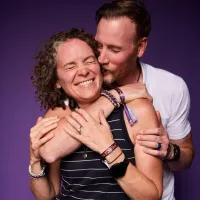
The
Road of Life
Podcast
With Meredith MacKay & Craig Bennett
Listen

54. Navigating Difficult Conversations in Relationships
Listen Now
Episode Transcription
Welcome back to the road of life podcast with Craig and Meredith. This week we're talking about Navigating difficult conversations with your spouse, with anybody really, but specifically in a marriage with your spouse. They can sometimes feel like a bit of a minefield.
Like you
know you've got something you need to bring up, something you want to talk about.
You know what's maybe not going to be the easiest conversation and I think our human nature tendency is to shy away from it, avoid
it,
for sure, it's uncomfortable, let's just pretend like this is not a thing and we'll just sweep it under the rug and let's hope it never comes up again. Which is the worst idea, it's the absolute 100 percent worst thing you can do.
And so, how do we go about doing that?
Having
those difficult conversations.
I do think to your point, because historically it's not something that I've ever really enjoyed and though I hate it and in previous relationships I would avoid it like the plague and ultimately it ended very poorly. Like it would, it chips away at the foundation, puts up a wall between you.
For sure. All of the metaphors that you can think of about distance, distance between, between you and your spouse, it does that. I think one is so
insidious, right? Cause you think it's the opposite. Yeah. You think you're keeping the distance out and staying close by not creating this conflict between you, but really it's the opposite.
Totally. And so I think that adopting the mindset of short term pain, longterm gain is critical here. It's critical because to your point, the tendency is, is like short term pain. I'm out. I don't want to, I'm gone. I'm not interested in this. Yeah. But if you can push through that. Short term discomfort on the other side of that is growth and it is better than the alternative.
Not
only growth, it's closer, closeness, closer connection. Like it's an obvious, difficult conversations are an opportunity to get closer instead of the trick your brain is playing on you, which makes it seem like the opposite. Yeah, you
get to grow together for sure. Yeah. Grow closer.
Yeah. And so let's just get really tactical and like literally walk the talk.
someone through step by step by step by step, how to set yourself up for as much success as you can in this difficult conversation.
Okay. So I think the first step is to make sure that it's the right time, like plan and make sure that it's that your spouse isn't, preoccupied with something else. They're not coming home from a pretty rough day.
Something's going on in their life that has turned it into a little chaotic or something like that. Their brain
is completely consumed by something else right now. Piling something else onto a brain that's already in a little bit of chaos. It doesn't
set you up for success. So as best you can find a reasonable time.
And that doesn't mean just put it off, put it off, put it off. There's never a good time. It's at some point we need to bite the bullet and deal with the issue, but there's usually a time when it's really not a good time to do it. And so find, find a time when you can. I
think that's part of a bigger sort of preparation step.
Part of finding an appropriate, not the right time, cause there's never a perfect time, but finding a time, a time when your spouse is receptive to a bigger conversation, not just a, what are we having for supper conversation, but. And, and flat out asking, like, I'm, I want to have a, We need to
talk.
Do you have a good time? When's a good time to do this?
Yeah. Like we need to have a bigger conversation about something. Like let's plan a time. But part of that preparation is also your own internal preparation on being super clear on what the conversation is about and what you want the outcome of the conversation to be.
Not just coming into a conversation like guns blazing, Like you've got a bunch of grievances you want to air. It's, what are you, what, what do you want the outcome of this conversation to be?
And to be clear, not what you want the outcome to be in, in other words that you want it to come out a certain way.
What we mean is, is that there's a resolution one way or the other. It doesn't necessarily mean it's the resolution that you're looking for.
So knowing what you want the outcome to be, I want to come to resolution on something, not necessarily I want this to be the outcome or I want this to be the resolution.
I want this, I want it to be my way. It's being open to the idea that you're looking to resolve a problem, but you're not looking for it to be, this to be the exact solution.
Your way is your solution is not the only solution. You're going to work together to find a solution.
Trying to be clear on what we mean by that.
You're what you want the outcome to be.
Yeah, for sure. But what I meant by that was coming in with an idea of where you want this conversation to go. So you've got a bit of a plan for the conversation and not just shooting from the hip with all the things that you're frustrated by. It's right. And so part of that, so that's the preparation step.
The next step is actually having the conversation. Once you've, once you've planned it and you've, you've got the time set aside, you're both ready for this conversation. Next step is actually having the conversation. And there's a couple of tools or tactics that are really helpful in this situation. And the first one is to, to speak from yourself, like use I statements.
Instead of you statements. It's not you do this, you do that, you never do this, you, you, you, you, you. That, that's going to be an ineffective way to engage this conversation. Using I statements is I feel this way. I'm frustrated by this. I'm upset and worried by this. This makes me feel this way. So focus the conversation on you, the impact to whatever you're talking about, the impact of that thing on you specifically, as opposed to the you, you, you, you, you, what the other
person is doing wrong.
Correct.
Yeah. No, totally agree. If, if you're looking to put up a wall and shut them out and turn this conversation into into a monologue and have them tune you out completely, then point the finger and tell them all the things that are doing. But if you're actually looking to engage in a conversation and come to a resolution solve an issue, then absolutely speak from your heart.
What, how it's impacting you, how you're feeling. And I think at the start, even that is, it might be contentious because maybe we don't have the skills yet. We haven't yet gotten to the point where. We're able to accept constructive criticism. Sometimes we get heated and it feels like an attack. Oh, you feel this way and I made you feel that way.
And so some people might get to a place where they still feel a little bit defensive. Yeah, exactly. This is a skill we're learning. We're building and we're growing. So at the outset, when you're starting this process, it might still get a little bit contentious, but if we keep working through it, it gets better.
Right. And coupling this with the 200 percent marriage, the a hundred percent responsibility mindset, when you're both working on that, that helps remove defensiveness from the situation. So it all kind of works together.
The next thing you can do in these situations. To keep it really constructive is to be very specific. The other trap that we tend to fall into as humans is we hyperbolize things like You always do this and you never do this and i'm always the one I've changed that crappy diaper every single time since that kid's been born Yeah.
So is that true? Every single time. And even if it is true, speaking in those extremities and those giant generalities and those giant hyperboles is even if it's true is not effective in moving you forward in a productive conversation. And so speaking in really specific instances, giving examples of a time when, as opposed to just throwing out the blanket statement of you always, you never type of thing.
Yeah. Again, another way to shut someone down. If you tell them how they're always missing the mark, how they're always wrong, how they're always failing you, that's a way to get them shut down. Yeah.
Generalities just never work.
Not going to work. And then the last one,
make it focused on
solutions. Yeah. The more you focus on, the more you get.
So if you want solutions, then you have to focus on solutions. It's okay to bring up a problem. So you identify it, you get clear on what the problem is. But then as soon as we're clear on what the problem is, we both know, we get it. The problem is this. Now, how do we transition to solutions and actually solve the problem?
Cause we don't want to live in the past. We don't want to live in problem land. We want to live in solution land. That's how you get to a exponential relationship.
And when you're speaking about the solutions and when you're working through to find the solution together, Speaking about what you want or what you need specifically in specifics, not what you don't want.
Again, not focusing on the negative stuff, not focusing on what you don't want, focusing on what you want the solution to be, what you want the outcome to be, what you want or need coming out of this conversation in this relationship as opposed to what you don't want.
Yeah, and focusing on solutions, you might not always agree on what the solution is. Mm hmm. It's really important to find the seed of agreement. We've talked about this in other episodes. Mm hmm. There's usually something, even if it's small, that you can attach to, that you can both agree on.
And that's where you can start, really, to pull from, to find a solution that works for both parties.
Yeah, when you can find that, whatever that tiny seed of agreement is, that one tiny thing you can find to have in common, that immediately puts you on the same team again, as opposed to feeling like you're on opposite teams, that seat of agreement puts you on the same team.
And you know, we've talked about it in the conflict resolution episode, finding that seat of agreement requires active listening on both sides. And so you may have been the one who brought up the conversation and you have things you want to say. That does not mean your partner, your spouse doesn't also have things that they want to say.
And when it's their turn to speak,
Being open to hear that. You have to be, you know, you're bringing up, we're assuming we're talking to someone who's bringing up the problem, but you also have to be willing to listen to the other side.
And not like you said, not just listening to respond, but listening to actually understand their perspectives so that you can find that seat of agreement.
Cause that is where the solution will come from.
And I think another thing that I have had to connect with over the years is letting your ego go a little bit. Yeah yeah. Yeah. Throughout my life, there's been times where you get into these discussions and it's like, no.
Like you, you take offense to your ego gets in the way and you're not willing to let something go or get on the same side of the table. So I'm not wrong in this. This is, I'm a hundred percent right. And you can be right, or you can be happy. So it's, it's one of those things where you can fight for being right and have your ego in intact, intact.
Thank you. Yeah. Or you can tell that little bugger to Pound sand and
be a little humble.
Yeah. And understand that it's not just about being right. It's about being happy and finding common ground and finding a solution that works for everybody. And so letting that ego go, and that's easier said than done.
I get that. And it takes practice and it takes work.
It takes intention and awareness to even notice it at first. Cause it's for me too. It was a highly ingrained default reaction to I am right. I'm always right. It takes that being willing to be open to feedback, being willing to like step outside of yourself and see Oh, I think that's my ego responding.
I think I'm more caught up in being right and that I didn't actually do that or whatever the case is. I'm more worried about being right that I am about finding a solution. Yeah. And that is going to be the pitfall that you fall into them.
I found the ego is more a pain in the butt than anything really.
Early days in my life, I thought it was helpful. It was more of a defense mechanism than anything really for me. But over time I've realized that I don't have a whole lot of use for him. He comes around and he's more of a pain in the body, he causes more trouble than he's worth. And so that little voice, whatever you naming, it also helps that there's Jack.
Jack
was the one that was talking. I need to shut Jack up and kick him off the road.
Yeah. He's trying to sabotage me here a little bit. Keep me safe. Keep me where I feel better. It's not where you want to be. You want to grow. And you want to improve your relationship. It's letting that relationship go with Jack, the ego, the one that's really probably got his claws in you.
And it's not easy, but it's necessary, absolutely worth it. If you can do that work to identify that voice, identify that ego and put them aside to really focus on what matters.
These conversations can be intimidating. I'm pretty conflict averse. I'm a very conflict averse human now.
And I've gotten more that way, generally, as I've gotten older. I definitely avoid it more often than I ever did as a younger person. because I'm so conflict averse, I don't love these difficult conversations. I just don't. They're uncomfortable, I don't like conflict, I don't want anything to do with it.
But going back to what we said at the beginning, that, Choosing to see these as an opportunity to grow closer together in your relationship and whether that's your marriage or that's your friend or that's your business partner, like, it really does apply to any difficult conversation you have to have in your life at any time.
And so choosing to see it through the lens of this is an opportunity for us to grow closer in our relationship, whatever that relationship may be.
Yeah.
And then just following the steps.
Yeah, I actually had a difficult conversation with a friend not that long ago.
Mm hmm, that's right.
Yeah, it was a situation where there was some, Miscommunication on both sides.
Yeah, it was just weird and I think both our egos got into it a little bit and it was like, well, and we didn't take ownership of the relationship. Like we talk about a hundred percent responsibility for the relationship and that, and I think we were both more of that 50 50 mentality and it was weird.
You know, we're both in the personal growth space and we both understand relationships and, and, and that we need to take a hundred percent responsibility. But in this situation, Particular case, we both let our egos get in the way a little bit. And, it caused us to lose a little bit of time, bonding and being close, but enough is enough.
We eventually just said, you know, like, let's just, let's, let's get to the bottom of this and yeah, it was a difficult, weird, awkward conversation at first, but we've grown so much more and as a result, and we're better friends now than we were before as a result of it. And so it really is. It's true that, you know, it feels so crappy in the moment.
Like why am I going to have this conversation? Like it's brutal. I don't want to have it. But when you do, you feel so much better because you've actually grown your friendship, your marriage, whatever it is, is actually strengthened by doing
it.
And if we can just always keep that in front of mind is like, yes, I get it.
It sucks now, but on the other side of this, it's so much better. So five minutes. It's 10 minutes, 20 minutes, whatever that conversation length is of discomfort for a lifetime of better.
And my guess is the most uncomfortable moment was right before the conversation started. It wasn't comfortable as soon as it started, but it's like our very first podcast episode.
You know, what's the antidote to fear and discomfort?
Do it.
Action. And so the worst you're ever going to feel is right before you open your mouth and have the conversation.
But it's also never going to be easier than now to do it. The longer you wait, the more the fear and the discomfort will have an opportunity to take over and allow you to not ever do it.
So it will never be
habits even more ingrained in the avoidance.
It will never be easier to start the process than it is right this moment. So If there's something that you have in a relationship, in a marriage that you know, you need to deal with a conversation that needs to be had, an apology that needs to be made, whatever it is.
Now is the time. There's never going to be an easier moment than this very moment right now. So I think that's the takeaway for this, this conversation is if there's something lingering out there in one of your relationships, it may be a family member, a spouse, it may be, it's a child, maybe it's a sister, a sibling, whatever it is, have that conversation, pick up the phone, call them, go to their house, whatever it is, but have that conversation.
Your relationship with them is worth of five minutes of discomfort.
Yeah.
It just is. And you can do it. You can get through the disc. That was my biggest lesson of 2023 is I can do the hard thing. You can do the hard thing too. So thanks for joining us on this difficult conversation. And I know there's someone in your life that would also benefit from this conversation.
And so share it with them, your spouse, your friend, your family member, whoever else needs to hear this conversation. Maybe it's the person you need to have the conversation with. Send this to them so that you're both ready.
It's a great idea.
Might break the ice a little bit.
Exactly. They know what's coming.
You know what's coming. Yeah. Helps out a little bit.
Yeah, so I've started asking, what's the one thing you're gonna do? Change coming out based on this episode that you're gonna do in your life. I think, I think we just challenged you to do it. It's, what's that outstanding conversation that you need to have?
Identify that person, send them the episode, then have the conversation.
Mm hmm.
Boom. Alright, get to it, and we'll see you next week. Bye for now.

Meet
Meredith & Craig
Life partners, business partners, and best friends. We left the corporate grind to become fulltime entrepreneurs... with no idea what we were doing.
That made for some interesting, amazing, stressful, awesome, painful, scary, awful, awesome, insightful, unbelievable decisions, moments, experiences, relationships, and quite honestly, we wouldn’t have it any other way.
Our marriage is the foundation for everything else we build in our lives. It is a cheat code for life, and we believe that having that part dialed in levels up every other part of life.
We help others live their dream life... and that starts with a rock solid relationship so they can level up the rest of their lives too.
Tune in for a dose of laughter, love, a gentle ass kicking, and game-changing wisdom that will help you unleash your potential and build the life of your dreams together.









